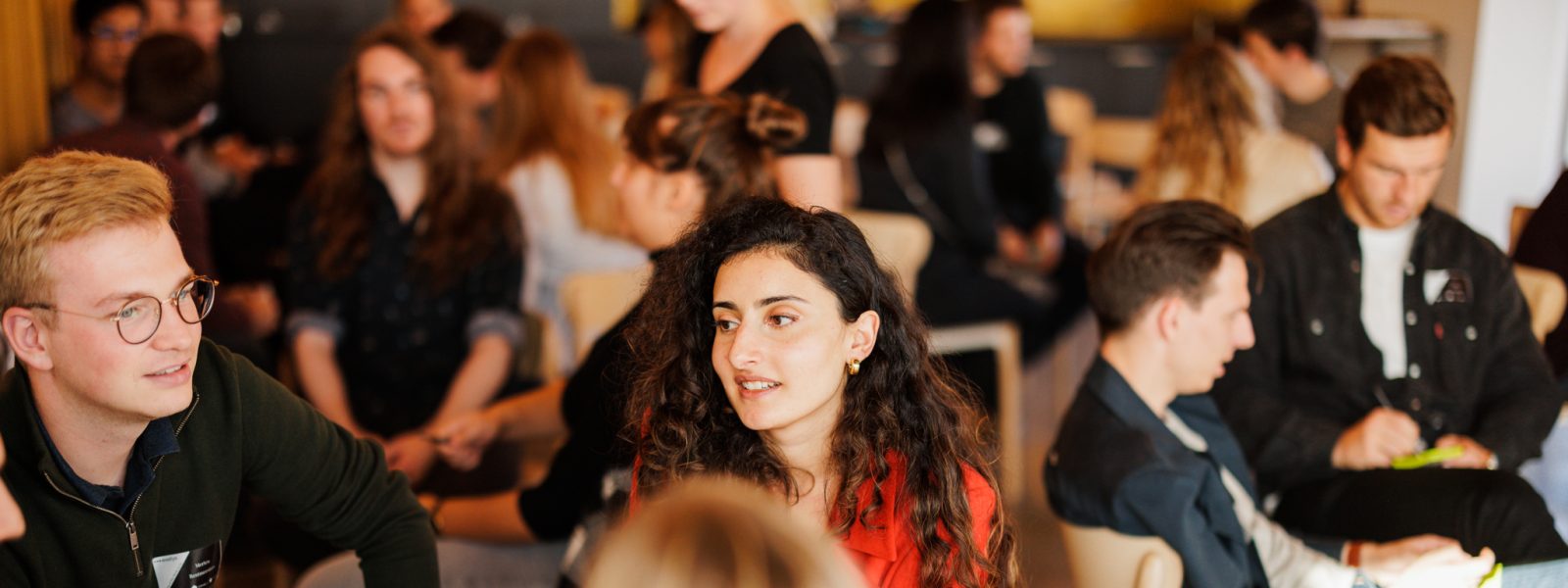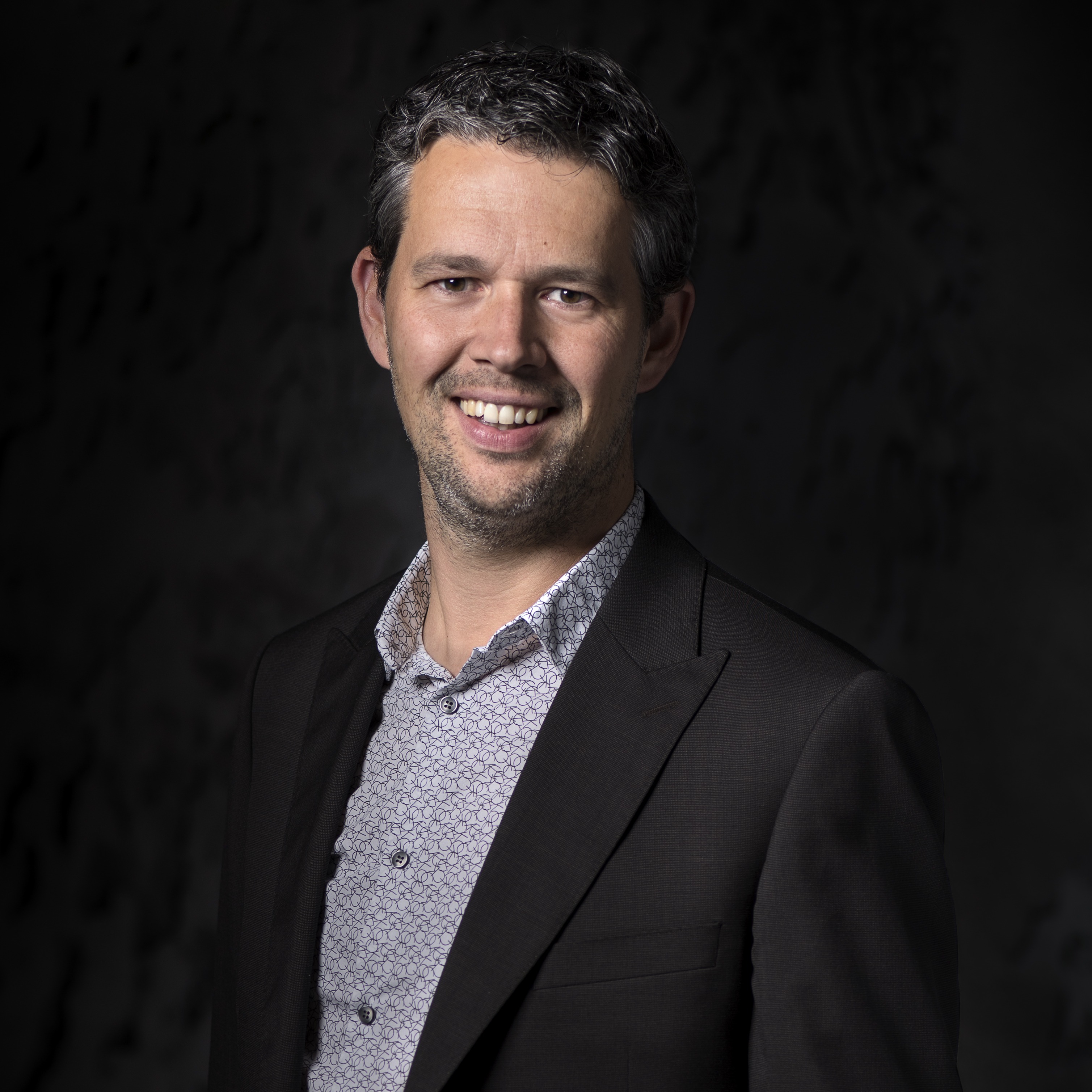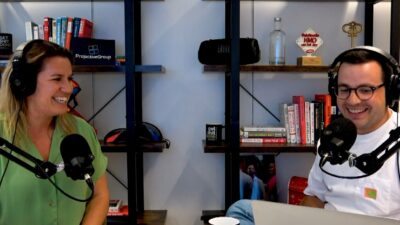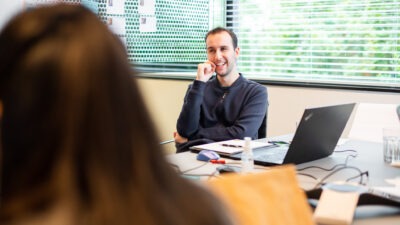Podcast: “We tend to focus on hard skills, but in reality soft skills have more impact.”
on 29 May 2023 for GraduatesFor this episode of our podcast Exellys Talks, we’ve invited Exellys alumna Svetlana Arutunyan. Svetlana is an expert by experience, since she has already completed her 2 year Start Smart programme at Exellys. Now, she has integrated at Belfius Bank where she’s working as a Functional Analyst.
Note: You can check out the full podcast episode in this 23-minute video or listen to the episode at the bottom of the page. You can find us on Spotify or YouTube as well. Please note that the podcast is recorded in Dutch and there are no subtitles. For the hearing impaired or those who don’t understand Dutch, we’ve included a written account (in English) below.
Svetlana, before we dive into your story, can you tell us a little bit about yourself?
My name is Svetlana, I’m 25 years old. My family is Armenian, but I was born in Moscow. We moved to Belgium – Antwerp more specifically – when I was 10 years old. Twelve years later, I graduated as a commercial engineer in policy informatics from the university of Antwerp. If I’d have to describe myself in just one word, it would have to be ‘curious’. I’m always curious to learn a new things, to have a new experience, and in my professional life I’m very curious about new developments as well.

I think that’s a wonderful quality to have! A few years ago, Exellys was your first ‘real’ job. How did you find us? And why did you decide to join us?
When I was in my third bachelor year, Exellys was one of the booths at a job fair at the university of Antwerp. My interest was immediately sparked, because Exellys has a niche focus on technology. I think it’s always a good thing to really focus on one thing and become an expert in that. So Exellys was top of mind when I graduated and had to start looking for my first job.
I think a lot of people graduating in a STEM field will relate: you have so many interests and there are so many options, how do you decide where you want to go and what you want to do? What job do you want to do on a daily basis, which industry do you want to get into? Pharma, finance, …? So I went through that whole process, just like many other STEM graduates I’m sure.
At Exellys, the application and onboarding process were very different from what I had experienced at other companies. It was much more personal. After my first conversation with Astrid, I already felt like she got me. She understood what I wanted to do and where my interests were. That’s how I got matched with Belfius Bank, where I’m still working today.
And last but not least, what really sets Exellys apart from other companies, is the coaching and trainings you get. There is a clear and structural plan for your growth, it’s not just a vague possibility for the future, like it can be at other companies.

Coaching and training are the things we’re trying to make a difference with, so it’s really great to hear you say that! After your onboarding process, you started working as a Functional Analyst at Belfius Bank. Can you explain what a Functional Analyst does?
We’re the bridge between the business and the developers. On one side, we translate business requirements (which can be pretty vague sometimes) into detailed technical documents for our developers. But that also means we have to challenge the business, because sometimes their expectations aren’t technically realisable. So that’s the technical aspect of the job, but there’s also a more human component, a team management component. You have to keep people motivated in a project, make sure they understand the project and are excited about it.
What is it like to work in a banking context? I can imagine, especially as a young person, that it wasn’t exactly in your top three of possible choices.
Well, I majored in Finance so for me, this opportunity was perfectly in line with my interests, since it’s a combination of finance and IT. I think the cliché of a bank being filled with old people might be true for certain environments and teams, but since I started in the AI team – which is a very young team – I never experienced that. It’s true that a banking environment comes with its challenges. It can be more difficult to get things done, for example, but I think that’s normal because security is so important at a bank. I think we all want our money to be safe in our accounts, right? So I’d say: don’t believe all the clichés. If you’re interested in banking, try it out!

At Belfius, you’ve had the opportunity to work in 3 different teams. Can you tell us a bit more about your various roles?
I started in the AI team as a functional analyst. After a few months, Belfius needed someone to lead a change management project in the RPA team. This role was challenging for me, it was something completely different from functional analysis so I really needed to redefine myself. My coach helped me a lot here, but more on that later. After this assignment, I felt the need to do something more technical. After all, I was working in IT but I hadn’t really practiced it, so I wanted to explore that. As I said: I’m a very curious person. I expressed this desire and I was heard, by Belfius and by my coach. Now I’m working for the Elasticsearch team within Belfius which is a lot more technical. So I needed to redefine myself again, which was quite a challenge.
That’s a nice trajectory over the course of 2 years. You’ve mentioned your coach a few times – what was the value of having a coach for you?
I had a few moments where things were a bit tough. When you start working, your skills aren’t always very developed. Also, since I studied policy informatics, I don’t really have a strong IT profile. So it was a growth process, and sometimes that can mean that you start doubting yourself and your abilities. Those are the times where having a coach makes a big difference. They take on a neutral position, guide you and give you advice. Your coach can also pull you out of certain thinking patterns. Sometimes you can get caught up in a negative spiral, which can be very subjective and not in line with reality. They also make a concrete plan to fill in the gaps in your skill set. If you had to do all these things on your own, your progress would be much slower because you might get caught in that cycle of negativity.

What does your relationship with your coach look like? Do you see each other on a regular basis, or can you just call him when something’s wrong?
Both. There are fixed feedback sessions every 3 months. Other companies have feedback moments too of course, but at Exellys they really take it very seriously. That has really helped me, to negate some false assumptions I had about myself for one, but also to get and receive feedback about how I was doing. Especially as an external consultant, it’s not always a given that you get feedback from your colleagues or even your manager, so having these fixed check-ins with your coach is very valuable. In addition to these fixed feedback meetings, I could call or text my coach Leslie whenever I felt the need to discuss something. He was like a lifeline, he was always there when I needed him. There were definitely times when those conversations were more personal, not so much about work. Having someone who’s really there for you and who listens, especially in a professional context, is very important and not easy to come by.
Besides coaching, we also put a lot of effort into trainings here at Exellys. You’ve mentioned a few times how trainings helped you fill gaps in your skill set. What did that process look like for you?
Exellys has a fixed training programme, built around hard skills and especially soft skills. For me personally, those soft skills have had the most impact, because those are things you don’t think about on your own usually. Communication skills or time management for example. You’ll learn these things gradually throughout your career by trial and error, but when you don’t focus on these things, the learning process is very slow. It helps to have a professional tell you how you can best go about certain challenges. Of course it’s up to you to apply these learnings in your day to day, otherwise it won’t have much effect. Communication skills, presentation skills, time management, how to give and receive feedback, … These are things that are vital at the beginning of your career, but at work or even at school, nobody tells you these things. A lot of these practical things aren’t part of the university curriculum. I think our school system focuses for 99% on hard skills and maybe 1% soft skills, whereas in reality it can be 80% soft skills and 20% hard skills! So I believe Exellys does a really good job in responding to this need.
I’ve also taken some hard skills training courses: I’ve done project management, Prince2, Scrum, … This has all been very valuable for me. When you start taking these courses in the beginning of your career, this really opens doors for your future.
Another good thing about Exellys is that in addition to this fixed training programme, you also get a training budget at your disposal. So if you think there’s a gap in your skill set and you can’t find the right course within the Exellys programme, you can use your budget to take additional classes. For example, I’ve taken a few online courses to improve my programming skills, and I’m doing a communication course as well. This opportunity to learn all these things is not to be taken for granted. That’s something you’re not likely to find anywhere else.

As mentioned before, you’ve done the whole programme and now you’ve integrated at Belfius Bank. Congratulations! How do you look back on your years with us?
First of all, I’d like to thank all Exellys employees and especially my coach for their support. I really appreciated having this support through my ups and downs, and to have that personal approach. We’re not all corporate sharks, thankfully!
On the other hand there’s the relaxed vibe at the office. You come in, you have a drink, you play pool,… Work isn’t just about being serious all the time, we also have fun and meet new people, share experiences, and so on.
Third, I’ve really built friendships with some of the people in my class, in trainings but also during the two weekends where we really dig deep into our skills and who we are as people, what our strengths and weaknesses are, and so on. It’s great to get the perspective of people who worked with you but also had fun with you for months, they’ve really gotten to know you so getting their perspective and feedback is very valuable.
In summary, I’ve really appreciated the two years I’ve spent here.
We were also glad to have you on board, Svetlana. Thank you for coming back for this podcast and hopefully you’ll drop by sometimes in the future!
About Exellys
Exellys is a Tech Talent Incubator. We match ambitious companies with the finest tech talent. Are you ready to drive the innovations of tomorrow? Ready to make an impact and become a future-fit digital leader?
Whether you are a graduate or (young) professional, Exellys will unlock your full potential by guiding you to a challenging work environment that perfectly matches your personality, expectations and ambitions.
On top of that, you are enrolled in one of our very own training and coaching programs (based on your personal and professional ambition and experience). This means that, while working as an Exellys consultant, we are helping you to bridge your ambition to excellence.
Through intensive training and coaching, you’ll gain the essential skills, competencies and knowledge necessary to become the highly effective professional you aim to be. Become an Exellyst and get in touch with us today!
Tags: career , coaching , exellyst , exellyst story , podcast




